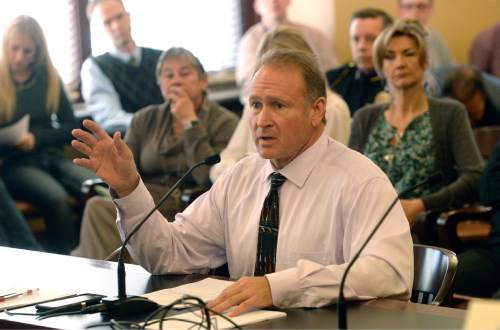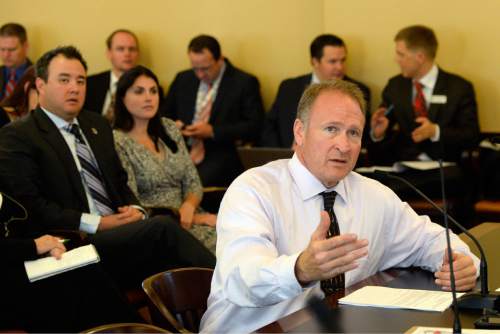This is an archived article that was published on sltrib.com in 2016, and information in the article may be outdated. It is provided only for personal research purposes and may not be reprinted.
For the second time in a week, The Church of Jesus Christ of Latter-day Saints is opposing a medical marijuana bill before the Utah Legislature, voicing concerns about control of the drug and urging a cautious approach to the issue of legalization.
While church leaders are "not in a position to evaluate specific medical claims," a statement from the church said, the state's predominant religion recognizes some may benefit from some compounds found in the marijuana plant.
The faith draws a clear distinction between SB73, sponsored by Sen. Mark Madsen, R-Saratoga Springs, to which the church reiterated its opposition, and SB89, sponsored by Sen. Evan Vickers, R-Cedar City, and Rep. Brad Daw, R-Orem, which raises no objections.
"These two competing pieces of legislation take very different approaches when it comes to issues like access, distribution, control and the potential harm of the hallucinogenic compound, THC," the church's statement said.
The Vickers-Daw bill does not allow the use of products containing THC. Instead, it seeks to legalize cannabidiol products, extracts from the marijuana plant that contain almost no THC.
The Madsen bill allows "whole-plant" access for patients with a recommendation from a doctor, including products containing THC and allows the use for a broader list of illnesses and permits parents to use the drug for their children.
"Wow. That is pretty darn explicit. It sounds to me like a very explicit and unambiguous statement and we appreciate it," Daw said Friday. "The issues they're raising with the other bill, they don't seem to have with our bill."
Both bills could be up for a vote in the Senate by the middle of next week. After the church issued a statement last week opposing Madsen's bill, the senator said one and perhaps two senators had switched their votes and were opposing the measure, although he was hopeful supporters could still muster the votes to pass SB73.
On Friday, Madsen said he was grateful to have the church lay out its objections to the bill — concerns he thinks he has adequately addressed, but is willing to do more to assuage, if possible.
"I'm very glad. I appreciate it. It's what I asked for, some specifics and where the issues lie. ... I think I can go to my colleagues now and go through each of the issues," he said. "It gives me something to focus on, and if the bill falls short in some area on one of those topics that is raised or there is something we can borrow that's functional and practical from the other bill, [we will]."
Generally, the church noted that there is a lack of research on the benefits and potential harms of medical marijuana.
"In addition to the therapeutic, treatment, and control questions, there are several other important issues to be resolved. At the forefront is that the use of medical marijuana is still illegal under federal law," the church said. "We agree with groups such as the American Medical Association who have said … that further study is warranted before significant public policy decisions on marijuana are advanced.
"For these reasons, the church urges a cautious approach," the statement concluded.
The illegality of marijuana under federal law has not been an issue for the church when it comes to its members in states where medical marijuana is legal. LDS faithful who use marijuana for their illnesses in those states can remain members in good standing and retain the right to attend Mormon temple rites.
Research in the United States on the drug has been stifled because it is classified as a Schedule I narcotic, on par with heroin and cocaine. Researchers can conduct sanctioned research only with plants acquired from a facility in Mississippi. Those doing unauthorized research jeopardize their funding and potential criminal charges.
Madsen noted that the Republican Congress has suspended any funding for enforcing marijuana laws in states with medical programs and the Obama administration has issued guidance to states looking to adopt medical programs — guidance Madsen said he follows in his bill.
Tuesday evening, Madsen plans to host a three-hour meeting that legislators can attend where he will lay out exactly how he envisions the medical marijuana program working.
Representatives will attend from the Department of Agriculture, the Health Department and the Utah Attorney General's Office and they plan to field any questions lawmakers or the public may have about the proposal.
"At least we know where to focus the conversation," Madsen said.
Twitter: @RobertGehrke





